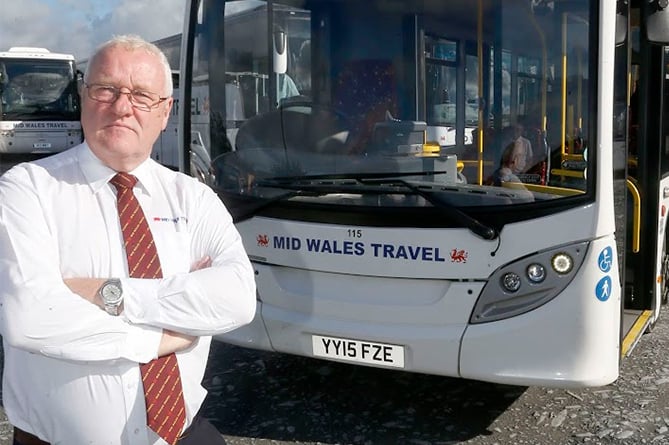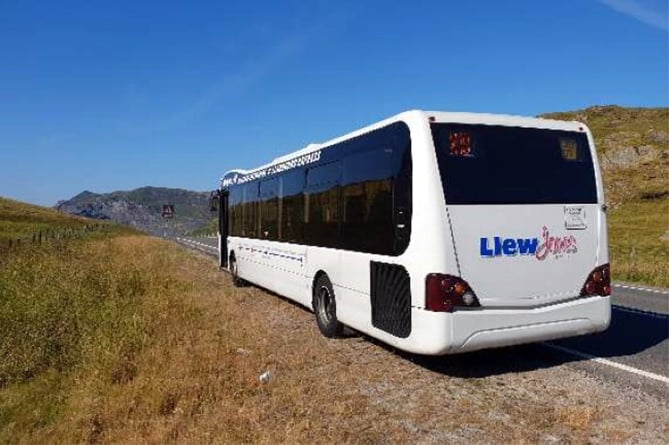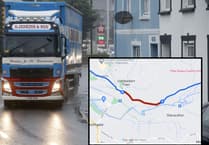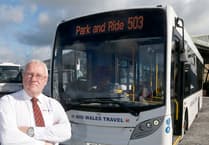Villages face being left behind after more bus services were reduced or cut completely in the past few days – with the future of the Ceredigion network very much in doubt.
Operator Mid Wales Travel announced last Monday it has been forced to reduce the 512, 301 and 304 routes – which are not subsidised by Ceredigion County Council – from the end of January.
Residents vented their frustration at the ‘terribly sad’ news and said how disastrous the reductions would be for increasingly isolated Borth and Llandre in particular.
Then on Tuesday, Llanrwst-based Llew Jones Coaches revealed the termination of the T19 bus service from Blaeneu Ffestiniog to Llandudno on 11 February – just 18 months after it was reintroduced.
The announcement drew fierce objection on social media from many of the service users who described it as ‘unfair’ on rural communities and called for an alternative to be provided by authorities.
The Cambrian News first revealed services in Ceredigion were in jeopardy in October with industry challenges resulting in the scrapping of the T22, T27 and the T29 routes in November – and the reduction of the 585 service.
Meanwhile, authorities remain unconvincing about the future of services in their responses to questions from the Cambrian News.
The Welsh Government – amid a well-documented campaign to push people from cars and onto public transport – insists its new electric routes will be enough to fill the gaps. But residents in Ceredigion, particularly those not on the A487 trunk road, and across Gwynedd are far from convinced.
Gwynedd Council insists that no services are under immediate threat but promises timetable amendments and new integrated mini-buses and taxi services – which might worry some residents that the writing is on the wall for other routes.
Ceredigion County Council last October called for ‘positive intervention’ from the Welsh Government to preserve particularly rural networks – with multiple companies indicating then it will be very difficult to maintain existing levels.
The main operators in Ceredigion are Mid Wales Travel, Evans Coaches, Lloyd’s Coaches and James Coaches. Many of them are now being forced to consider reducing timetables.
In Gwynedd, where the situation appears to be slightly rosier, the network is administered by Llew Jones Coaches, Lloyd’s Coaches, Dilwyn’s Coaches, Gwynfor Coaches and Cerbydau Berwyn Coaches.
The Cambrian News has contacted these companies enquiring whether any services are at risk or face reductions. We are yet to hear back from all but Mid Wales Travel and Llew Jones.
But operators have repeatedly warned the uncertainty comes amid a desperately difficult time for the industry.
Enormous hikes in fuel prices, plummeting passenger numbers (below 50 per cent of pre-pandemic levels), driver shortages and an end to government subsidies mean buses all over Wales are under threat.
In Ceredigion, Aberystwyth-based Mid Wales Travel operates six services across the county and its owner, Mel Evans, told the Cambrian News the ‘last thing he wants to do is walk away.’
But he warned passenger numbers need to improve if the bus services are to be salvaged – because companies cannot continue running at a loss.

“We’re just trying to save these services – we’re not trying to cut them; we’re trying to save them,” he said.
“We’re doing our best to keep our services going. I’m not making any money I can assure you of that.
“If enough people use the services, we’ll keep it going.
“We certainly don’t want to walk away from these services at all, but we can’t constantly sustain a loss.
“And hopefully we can go on longer than six months by doing something now. Hopefully by working with passengers we can get numbers back up and save the services.”
“We hope we can carry on. We think there’s a good chance.”
He says the cost of the company’s weekly fuel bill for just school runs went up by £6,000 – and service runs were similar.
The services now operating a reduced timetable are the 512 service from Aberystwyth to Ynyslas via Bow Street, the 301 from Aberystwyth to Penparcau via Waunfawr and the 304 Penparcau circular.
The 512 has been cut from an hourly service of 11 buses, to only six. The 301 is down from an hourly nine buses to four per day. And the 304 is down from an hourly service of nine buses to five.
The subsidised 525, 526 and 588 services will continue at previous levels.
Borth resident Pat Richards said: “There has been no consultation, no planning around train times, no planning for college students, no planning for connections to the wider bus network.
“Mid Wales Travel and Ceredigion County Council are making public transport less of an option for so many and disproportionately affecting those who already have less mobility.
“Degrading services like this bus route make it harder for people to access other services like education, healthcare and shopping – and to get to and from work.
“Making a service less accessible means fewer people can use it and so becomes the justification for further cuts and so on. It is essential to increase cheap and efficient public transport options, not remove them.”
He insisted he was not criticising the bus company or its employees – who are a helpful and ‘cheerful asset’ – and he understands the difficult climate facing operators.
A petition has also been launched by Borth residents to save the 512 service. It reads: “We call on Ceredigion County Council and Welsh Government to provide emergency funding to sustain the service as it currently operates for the next six months; and to use that time to find a viable long-term solution, in consultation with local residents - whether through financial support to the current operator, or a new arrangement with a new operator - delivering, as a minimum, the current level of service.”
In Gwynedd, the T19 service travels through the small villages of Bewts-y-Coed, Llanrwst, Llandrillo-Yn-Rhos and Dolwyddelan connecting them with the larger towns of Llandudno and Conwy – and workplaces, schools and colleges.

A spokesperson for Llew Jones said: “... due to a huge reduction in passengers since the Covid-19 pandemic, and no indications that the numbers will recover any further, the T19 has becoming increasingly financially unviable, and we have been left with no option but to terminate the service from 11 February to prevent further losses.
“The decision to withdraw the service has not been taken lightly as we appreciate the impact that this may have on local bus users.
“We have been working closely with Welsh Government, Traws Cymru and Conwy County Borough Council to identify and develop a solution; unfortunately, this has not been possible at this point.
“We remain committed to finding a solution that supports the best interests and needs of all parties concerned; however, if we cannot achieve this then the last day of operation for the T19 service will be Saturday, 11 February.
“No other routes or services are affected by this unfortunate, yet very necessary, decision. The 19 bus operating between Llandudno and Betws-y-Coed is not affected.”
In response, Plaid Cymru MS for Dwyfor Meirionnydd, Mabon ap Gwynfor, called for an urgent meeting with the Welsh Government Transport Minister, Julie James MS, after the announcement.
Aberconwy Conservative MS Janet Finch-Saunders has launched a petition to save the service – calling on co-operation between regional councils.
Mr ap Gwynfor said: “I am very concerned to hear of plans to axe the T19 – a service that many of my constituents rely on.
“The impact of this on the elderly, young people, families and more will be very disruptive, and will also cost them much more – a single bus journey costs £5 while a single train journey costs £9.20.
“I am particularly disappointed given the noise coming from the Welsh Government about investing in public transport. This service was introduced only a little over 18 months ago, and so it’s surprising that this decision has now been taken.”
A new report from think tank WPI Economics, commissioned by the Confederation of Passenger Transport (CPT), shows how major benefits could be reaped by levelling the playing field between private motoring and public transport in Wales.
It says that to go the full distance of meeting the government’s decarbonisation targets, packages across Wales must cover investment in bus services and infrastructure, subsidised bus fares and charging motorists to drive in congested urban areas.
The Welsh Government, in announcing a White Paper last March designed to overhaul how the nation’s bus networks are managed and operated, said the changes would make bus travel easier for everyone.
A Welsh Parliament Climate Change, Environment and Infrastructure Committee report from October says: “For many people living in transport poverty, the lack of access to affordable and reliable public transport will make their lives even harder.
“We know that disabled people, older people, and women will be affected more than other groups. People living in rural areas often can’t access the services they need to be able to live and work full lives.”
Social media criticism in the wake of the announcements often focused on the seemingly contradictory messaging coming from the Senedd. Ministers say they are aiming to incentivise bus travel at the same time as allowing rural networks to be decimated, critics say.
In response to our story, a Welsh Government spokesperson said: “We are working on improving connectivity between major centres and rural communities via our Traws Cymru service.
“We have set out ambitious plans for bus services in our Bus Reform White Paper. These plans would fundamentally change the way bus services are planned, allowing all levels of government to work together to design the bus networks which communities need and maximise the value we get for our investment in bus services.”
The spokesperson added that the government has recently agreed to award a new contract for the key Transcom T1 electric bus route linking Aberystwyth to Carmarthen via Aberaeron and Lampeter. This will operate hourly weekdays and Saturdays with an enhanced service on Sunday.
But this will come as no consolation to those in places like the remote seaside village of Borth who could soon lose their only bus route into Aberystwyth and their GP surgery, under threat due to doctor shortages. Similar concerns exist for those in smaller Gwynedd villages.
A Cyngor Gwynedd spokesperson said: “As a council, we fully recognise the importance of accessible public transport in the county and to provide safe, quality and cost-effective transport for Gwynedd residents – despite the challenging period we face.
“Recently we have been working closely with Transport for Wales officers to review the Gwynedd bus network, with the aim to improve transport provision by amending the timetables to strengthen links between buses and trains and create wider travel opportunities.
“Our vision is to use the resources we already have and to tailor the timetables to operate more sustainably with the hope of increasing travel possibilities for rural areas that do not currently have sufficient provision. This could involve using a taxi or a mini bus that feeds into main bus services on the strategic network. We are currently out to tender on public service buses in the Arfon area, with Dwyfor and Meirionnydd to follow later in the year.
“There are plans to introduce the new T22 service later this year, to serve Blaenau Ffestiniog – Caernarfon via Porthmadog with 4 electric buses. The proposed timetables for the new TrawsCymru T22 service have been designed to provide a cohesive service with the TrawsCymru T2 service (Aberystwyth - Bangor via Dolgellau) and to provide strong links in Porthmadog for customers wishing to connect between T2 service journeys to and from Bangor and Caernarfon .
“We currently only have a small percentage of late-night journeys that have not been re-instated since Covid-19 due to driver shortages and there are no services under threat at present.”
A Ceredigion County Council spokesperson said: “There has been a significant increase in costs associated with providing bus services with a reduction in general terms of the amount of income generated from passengers in the form of fares. It is therefore a volatile and difficult situation which is compounded by uncertainty relating to future levels of governmental funding and the structures and mechanisms underpinning these.
“The contracts for the council-supported services are due to end during 2023. A procurement process will be undertaken with a view of providing services, thereafter, that meet statutory learner travel requirements and offer a level of travel opportunities for the general public within the allocated budget.
“The council is not in a position to comment on the actions or intentions of any bus operator with regards their future plans which includes in relation to services they currently operate, whether they are commercial or supported, or may consider providing in the future.”
It remains to be seen whether the government’s new strategy will make inroads in solving the problems it sets out to address, nor whether regional councils like Ceredigion and Gwynedd can safeguard dwindling services.
But authorities will know as well as we do, that they will have significant rural populations to answer to if they don’t.
Have your say on cuts to bus services near you. Get in touch today: email edit@cambrian-news.co.uk or phone 01970 615000







